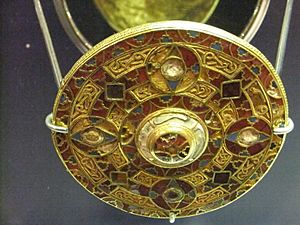Kingston Brooch facts for kids
Quick facts for kids Kingston Brooch |
|
|---|---|
 |
|
| Material | Gold, garnet, pearl and glass |
| Size | 8 cm in diameter |
| Created | 7th century AD |
| Period/culture | Anglo-Saxon |
| Discovered | 1771 |
| Place | Kingston, England |
| Present location | World Museum Liverpool |
The Kingston Brooch is a very special piece of ancient jewelry. It's the biggest known brooch from the Anglo-Saxon time. Experts think it's an amazing example of how these brooches were made. This beautiful brooch was created in the 600s. Today, you can see it at the World Museum Liverpool in Liverpool, England.
Contents
What Does the Kingston Brooch Look Like?
The Kingston Brooch is a big, round piece of jewelry. It's slightly curved, like a dome. It's made from two flat pieces of gold. These gold pieces are joined together by a thin band of gold wire. This wire is decorated with tiny beads.
The design on the brooch looks like a cross. In the middle, there's a raised decoration called a boss. There are also four smaller bosses around it. These smaller parts are decorated with shiny white shell.
The brooch is made of gold. It has colorful pieces set into it. These include bright blue glass, white shell, pearls, and red garnet stones. The brooch is about 8 centimeters (3 inches) wide. This amazing piece of art was made in the 600s.
How Was the Kingston Brooch Discovered?
The Kingston Brooch was found on August 5, 1771. It was discovered on the North Downs hills. These hills are located above the village of Kingston, Kent in England. A person named Reverend Bryan Faussett found it. He was a church leader in Kingston.
Faussett was digging in an old cemetery. He explored 308 graves there. These graves were from the early Middle Ages. The brooch was found in a burial mound, which is like a small hill over a grave. This specific grave was number 25.
Who Was Buried with the Brooch?
The brooch was found in the grave of a small, wealthy woman. Her grave contained many valuable items. These included a gold necklace pendant. There was also a glass cup and two silver safety-pin brooches. A bronze hanging-bowl was found too.
The burial mound itself was a medium size. However, the grave where the woman was buried was very large. It was about 10 feet long, 8 feet wide, and 6 feet deep. This was much bigger than most graves from that time.
What Did People Think of the Brooch?
When the brooch was found, it was in excellent condition. It was made of gold with garnet, shell, and blue glass. Bryan Faussett wrote notes about his discovery. He described the brooch as "one of the most curious and, for its size, costly pieces of antiquity ever discovered in England." This means he thought it was very special and valuable.
Who Owned the Kingston Brooch Over Time?
The first owner of the brooch was Bryan Faussett, who found it. After he passed away, it went to his grandson. His grandson was named Godfrey Faussett. He was a professor at the University of Oxford.
In 1853, Godfrey Faussett's son, also named Bryan, tried to sell his grandfather's collection. He offered it to the British Museum. However, the museum decided not to buy it. Some people in archaeology were upset about this.
In 1855, the collection was sold to a different person. This person was Joseph Mayer. He was an antiquarian, someone who studies old things. Mayer was also a collector. In 1867, Joseph Mayer gave the brooch and his entire collection to the Liverpool Museum. This is why you can see it there today.
See also
- Harford Farm Brooch another Kentish 7th-century brooch
 | Percy Lavon Julian |
 | Katherine Johnson |
 | George Washington Carver |
 | Annie Easley |

